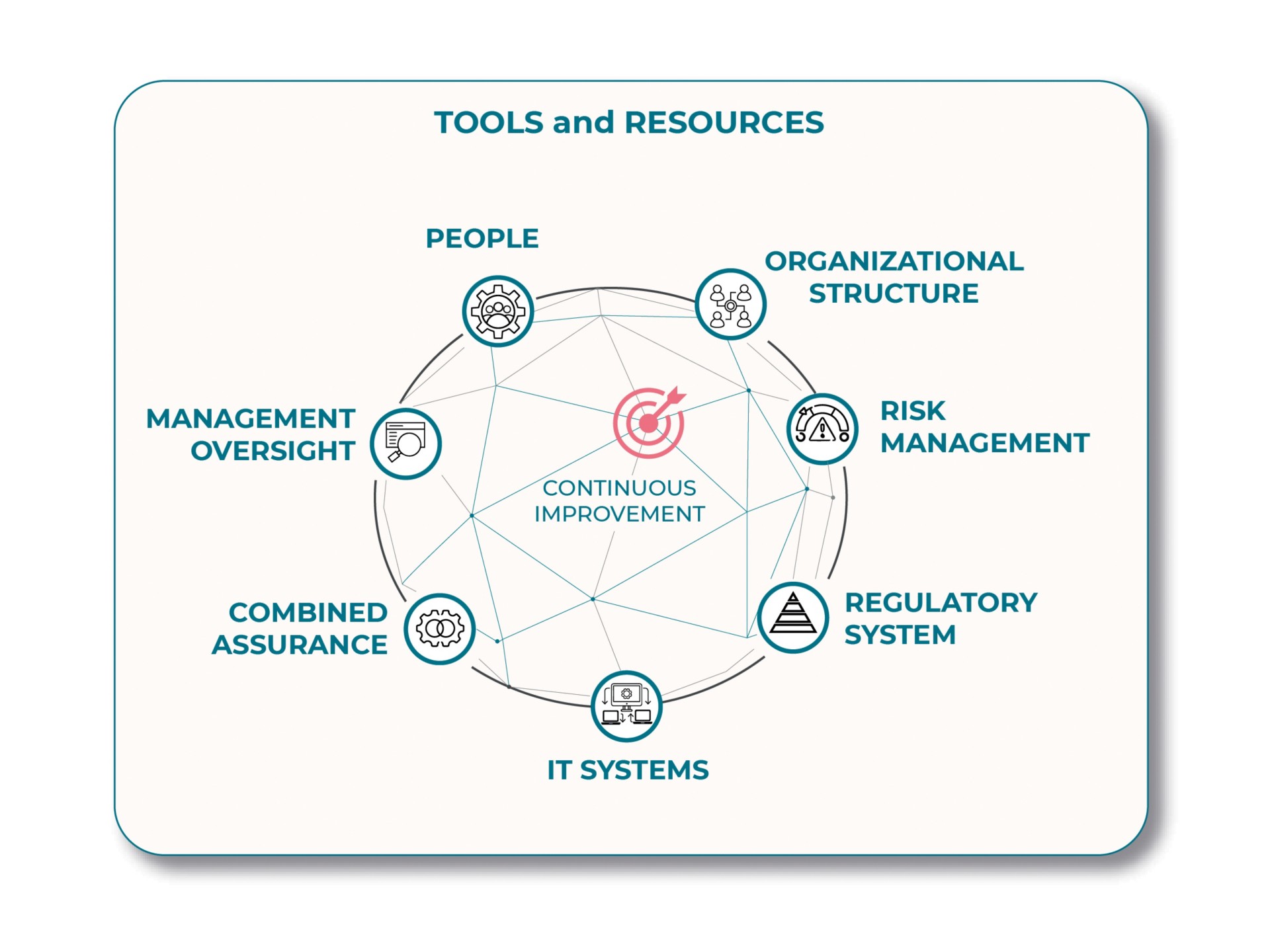Internal Control and Risk Management System
The actors in the Internal Auditing and Risk Management System act according to a three-level auditing model.
ICRMS Actors and the three levels of control
Eni's Internal Control and Risk Management System (SCIGR) is referred to as the Eni Risk and Internal Control Holistic framework (enrich) and, therefore, the use of this term must be considered fully equivalent to that of SCIGR (or System or Framework) for the purposes of transposing the recommendations of the Corporate Governance Code or other internal or external regulations that refer to the Internal Control and Risk Management System.
The roles of the Framework act according to the 3-level control model.
The roles and the 3-level control
The roles of the Framework act according to the 3-level control model:
With the support of specialist functions where necessary, it identifies, assesses, manages and monitors risks in its purview, in relation to which identifies, implements and monitors over time specific treatment actions/controls. It consists of the line management/risk owners of both business processes and support processes.
It monitors the main categories of corporate risks and defines guidelines on the control systems relating to ECG-Ethics, Compliance and Governance issues (subject to approval by the Governance Bodies and Organisms) and the relevant processes in order to ensure their effective and efficient handling along the entire value chain. It supports the Line management/risk owners (1st control level) both in identifying and assessing the main risks and in defining and implementing appropriate risk management systems, through treatment actions and specific controls. By means of an action plan, it monitors the adequacy and functioning of controls put in place to monitor the main risks and provides assurance to the Governance Bodies and Organisms on the models for which they are responsible and on the related internal regulatory framework of reference and their effective functioning. It consists of the Process Owners, of business functions with specialised expertise in specific risk categories and of Corporate committees supporting the CEO of Eni SpA.
The roles of the 2nd control level work, where possible, in coordination to maximise the effectiveness and efficiency of control systems in an end-to-end perspective.
The organisation of the 1st and 2nd control level is in line with the size, complexity, specific risk profile and regulatory context where each company works.
It provides assurance and independent advisory to the Governance Bodies and Organisms and to management, on the adequacy and effective operation of the 1st and 2nd level of control and on the Eni Risk and Internal Control Holistic framework as a whole. It is carried out by the Eni SpA Internal Audit function which, based on a centralized model, performs risk-based audits on the overall Framework, through monitoring activities on Eni SpA, subsidiaries, associated companies and third parties.


Coordination between the 3 levels of control
While respecting their roles and responsibilities, the 3 levels of control communicate, collaborate and coordinate with the aim of maximising the effectiveness and efficiency of the control systems, the overall risk coverage and the creation of sustainable value along the entire value chain (end-to-end perspective).
In order to allow the above-mentioned control levels and Governance Bodies and Organisms to perform their roles in terms of Internal Control and Risk Management System, specific information flows have been defined, coordinated and adequate in terms of contents and timing.
In particular, the interaction among the three levels of control (so-called combined assurance) aims to provide the Governance Bodies and Organisms and management with an integrated and holistic view of the control and monitoring activities (carried out by the same three levels) and of their effectiveness and efficiency.
All of the flows supporting the Internal Control and Risk Management System assessments by the Eni SpA BoD go towards the Eni SpA CCR, which performs a preliminary analysis whose results are reported directly to the Eni SpA BoD, mainly as part of its periodic reports. These flows are also transmitted to the Eni SpA BSA for performance of the duties it is assigned by law concerning the Internal Control and Risk Management System.
Enrich Tools
PEOPLE - They are not limited to compliance with the regulatory system and organizational structure, but actively contribute to the continuous improvement of the design and functioning of controls, contributing to the identification, measurement, management and monitoring of current and future risks.
ORGANIZATIONAL STRUCTURE - It focuses on the main responsibilities of each role that may also represent control measures and ensures, in synergy with the regulatory and power system, that decision-making is assigned and exercised at an appropriate level of competence and responsibility.
RISK MANAGEMENT - These activities are performed by the Risk Owner/Line management with the support of 2nd level control functions such as, in particular: the Integrated Risk Management function of Eni SpA, the Risk Specialists where existing, the Integrated Compliance function, the Corporate Affairs and Governance function and the Planning and Control function of Eni SpA.
Risk owners/Line management identify mitigation actions/controls on the basis of a cost-benefit analysis. The Integrated Risk Management function provides an integrated assessment to management and Board of Directors.
IT SYSTEMS - The automation of processes and controls facilitates the timely sharing of data and information among the various business functions, maximises the effectiveness of controls and monitoring activities and ensures, among other things, traceability and segregation of duties and decision-making processes.
The availability of relevant, accurate and up-to-date data is a company asset and enables real-time analysis and insights, as well as the ability to prevent/manage possible risk scenarios.
COMBINED ASSURANCE - Without prejudice to the respect of roles, responsibilities, competences and prerogatives assigned by corporate models and by the law, Eni promotes coordination and effective cooperation between the various roles of the Framework with a view to maximising the effectiveness and efficiency of the System and of corporate activities.
In particular, this approach brings together the operations between the 2nd level control functions and between the latter and the 3rd level, and is implemented according to the evolution of risks and governance and operational structures. Combined assurance covers the following main activities:
- Planning of control/monitoring activities: to effectively identify and manage any overlapping areas and implement possible synergies.
- Execution of audits: to identify possible areas of reliance and/or assess the possibility of carrying out joint control/monitoring activities.
- Action plan monitoring: to optimise the content and/or timing of actions defined as a result of the various control activities and/or to define structural/transversal initiatives, thereby optimising the resources deployed.
- Reporting: to optimise flows and reporting to Governance Bodies and Organisms and to management.
- Methodologies: alignment and use of a homogeneous and consistent language among the 3 levels of control and the supporting IT systems, in order to maximise the synergies described above.
MANAGEMENT OVERSIGHT - Management establishes and adopts models for continuous monitoring with a risk-based approach, suitable for assessing the level of effectiveness and efficiency of activities (design and operation) and for promptly intercepting any risks and/or opportunities.
In the context of management and coordination, monitoring models involve all process steps (in an end-to-end perspective) regardless of whether they are managed by Eni SpA or subsidiaries. Monitoring reinforces the coordination between the 1st and 2nd levels of control and decision-making awareness.





















